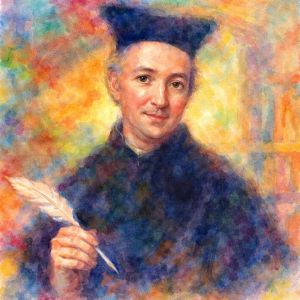 Spanish Jesuit writer Baltasar Gracián y Morales (1601–1658) was born in Belmonte,
in the Kingdom of Aragon, around the time of Shakespeare and
Cervantes. He entered religious study early, beginning preparation for the priesthood at just fifteen.
Spanish Jesuit writer Baltasar Gracián y Morales (1601–1658) was born in Belmonte,
in the Kingdom of Aragon, around the time of Shakespeare and
Cervantes. He entered religious study early, beginning preparation for the priesthood at just fifteen.
Writing during Spain’s Golden Age, Gracián is best known for his three-part novel, The Critic (El Criticón) (1651, 1653, 1657), a philosophical allegory that looks at the world through the eyes of an outsider, questioning custom, power, and illusion.
A fierce advocate of free expression, he wrote, “Use human means as though divine ones did not exist, and use divine means as though there were no human ones.”
A wise and unsparing observer of society, Gracián counseled royalty in the art of living, teaching morality, restraint, and self-love. His books El Héroe (1637) and El Político (1640) explore heroism and leadership and offer enduring insight: “The path to greatness is always along with others.”
Remarkably relevant today, Gracián influenced later thinkers including Friedrich Nietzsche and Arthur Schopenhauer, who described The Art of Worldly Wisdom as “a book made for constant use, a companion for life.”
“Quit while you’re ahead. All the best gamblers do,” Gracián advised, adding that there were four ways to live well: live many years, travel through many lands, read good books, and speak with wise friends.
“Renew your brilliance,” he said. “It is the privilege of the Phoenix... Dare... dawning many times, like the sun.”
More Gracián Quotations
 Not knowing is part of understanding.
Not knowing is part of understanding.
